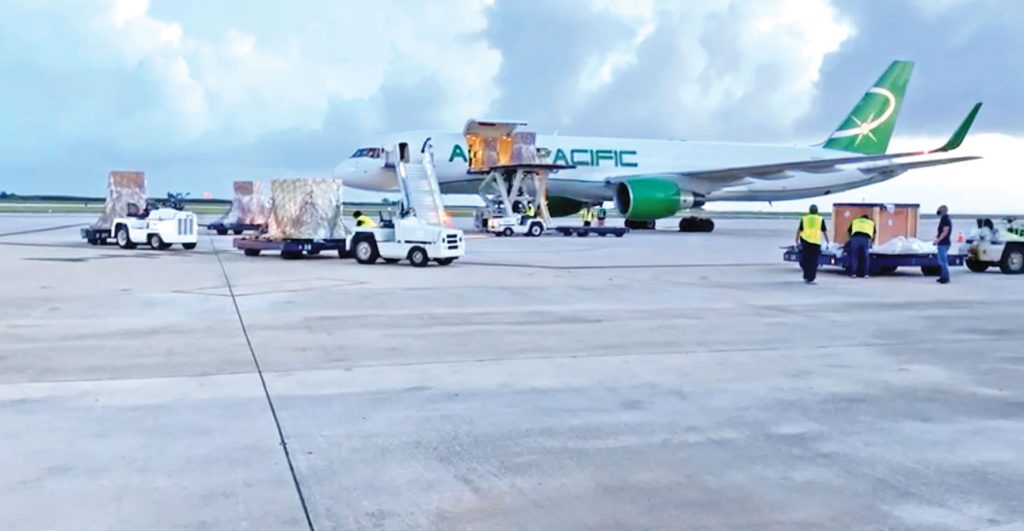10 vaccine freezers arrive
1 new case added to CNMI total

Photo shows the arrival of an Asia Pacific plane chartered by the CNMI government that came in from Korea last Nov. 30 containing 10 ultra-cold freezers that will store the COVID-19 vaccines at the Commonwealth Healthcare Corp. (CONTRIBUTED PHOTO)
An Asia Pacific plane chartered by the CNMI government came in from South Korea last Nov. 30, carrying 10 ultra-cold freezers that will store the COVID-19 vaccines that will be allocated to the CNMI.
Patrick Guerrero, the governor’s authorized representative, told Saipan Tribune that the freezers will be able to hold hundreds of COVID-19 vaccine doses.
Meanwhile, one more person was confirmed positive for COVID-19 in the CNMI last Monday, bringing the CNMI total to 106. The individual was identified by travel screening and confirmed diagnosis through testing upon arrival. The individual has been safely in quarantine and was moved to the designated isolation area for close monitoring. CHCC has already initiated contact tracing for the most immediate contacts of the new confirmed case, including passengers on the same flight.
Prior to getting the 10 vaccine freezers, the Commonwealth Healthcare Corp. reached out to local stores to inquire if they have these ultra-cold freezers but no one on the islands had them, Guerrero said. He said they went to the United States first but even the top known brands did not carry any ultra-cold freezers.
One of the first promising COVID-19 vaccine by Pfizer must be stored at the ultra-cold temperature of -70°C. These kinds of freezers are rare outside of medical research facilities. Due to the vaccines needing to be stored at such a freezing temperature, these freezers have been in demand and are sold out until June 2021.
Guerrero said the CNMI would not be able to get one until next year in June, which prompted him to look at Korea because of its technical expertise and the fact that both have similar power infrastructures. This means both countries are able to supply each other’s electronics and use the same amount of power.
Guerrero said that once he found the freezers, he wasn’t able to make a payment right away and lost some units to Australia. In fact, the CNMI was in competition with other countries for these freezers. “We competed heavily on these and finally made a deal with the company through our supplier and we were able to get 10 of the units,” said Guerrero.
Even if the vaccines aren’t in yet, Guerrero stated that it is essential that CHCC prepares and set up the equipment in a secure place. A unique feature of these freezers is that they can be controlled and their temperature monitored remotely.
The plan is to have two freezers on Rota and two freezers on Tinian, and six on Saipan. That way, in case one unit breaks down, both Rota and Tinian will still have a backup freezer. This is not official yet, though, said Guerrero.
Also, he doesn’t think that the CNMI will receive thousands of COVID-19 vaccines at a time, but if the CNMI does, there will be enough space.
As for how much the CNMI government paid for these freezers, Guerrero stated that all 10 units cost below $150,000. Each freezer cost between $12,000 and $13,000, plus a few other necessary accessories to go along with it.
Guerrero stated that the CNMI government paid for the units out of pocket, but this is an eligible reimbursable expense through the Federal Emergency Management Agency.
“We already have the guidance that says ‘ultra-cold freezer are eligible for reimbursement,’ so we would be submitting these costs to FEMA and look to reimburse the CNMI government, but we spent our own money first,” said Guerrero.
When asked if he would take the vaccine, Guerrero stated that because he’s has more information than an average person in regards to risk factors, he and his family will still take the vaccine. “I take science and health, always weigh out on the benefits, and there’s always a risk, but I think with what we’re dealing with right now…the information that we’re getting right now tells us that it’s safe to take,” said Guerrero.
The CNMI has yet to receive the vaccines because it has not yet been approved by the Food and Drug Administration for Emergency Use Authorization.























